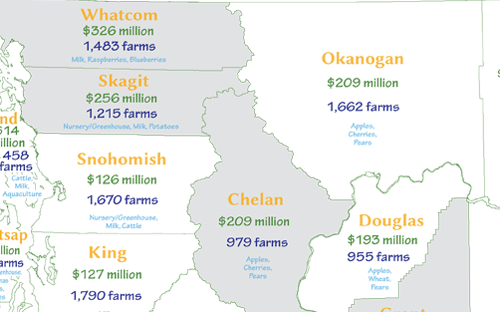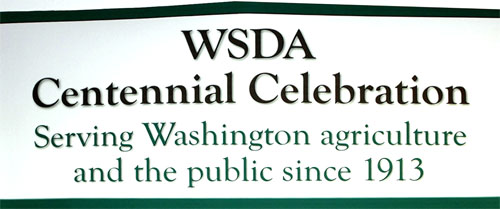home | internet service | web design | business directory | bulletin board | advertise | events calendar | contact | weather | cams

|
 Former Okanogan County Commissioner Don R. "Bud" Hover was appointed by Governor Jay Inslee to be Washington State Director of Agriculture. Former Okanogan County Commissioner Don R. "Bud" Hover was appointed by Governor Jay Inslee to be Washington State Director of Agriculture.Ground Game Six months into his job as Washington State Director of Agriculture, alfalfa rancher Don R. “Bud” Hover of Winthrop says he’s learned an unexpected thing or two about government and the people who run it. “I really like my job,” says a clearly enthusiastic Hover, a Republican who was asked by Democratic Gov. Jay Inslee to head up the agriculture department after he lost his seat on the Okanogan County Commission last year by 10 votes to fellow Republican Ray Campbell. When Hover ran for re-election to the county commission, the Washington State Farm Bureau’s local Okanogan County organization refused to endorse him. Asked if he finds it ironic that he now finds himself in the position of helping the Farm Bureau achieve its goals, Hover smilingly replies: “It’s somewhat sweet in a way.” But he adds, “I would still be working to make things better for farmers. I don’t hold a grudge.” The agricultural production and food processing system that the department he heads oversees has a $46 billion annual market value and accounts for 13 percent of the state’s revenues. Its activities affect the state’s nearly 3,000 food processors and its 39,500 farmers and ranchers, who bring some $9 to $10 billion worth of products to market each year. Thirty percent of what they grow is exported out of the country. Agriculture is the biggest private employer in the state with more than160,000 employees, counting seasonal workers. With more than 300 products, Washington is second only to California in the number of agricultural items it produces.  The WSDA website includes this map showing the value of crops and livestock in the state as of 2011. CLICK TO SEE FULL MAP The WSDA website includes this map showing the value of crops and livestock in the state as of 2011. CLICK TO SEE FULL MAPA big deal, in other words. But Hover, a former professional football player with the Washington Redskins, wasn’t looking to be director of agriculture after he lost his seat on the county commission. Active on the Washington State Salmon Recovery Funding Board, he had just finished getting his master’s degree in public administration from the University of Washington and was hoping for a seat on the Northwest Power and Conservation Council. Instead, Inslee asked him to oversee the state’s agriculture department; the job pays $118,000 a year. Hover says his first surprise was the size and scope of the responsibilities carried out by the department he heads. Even though he’s a rancher, before he took the job he didn’t fully appreciate how important the agriculture department is, not just to farmers, ranchers and food processors but to consumers of their products, he told the Methow Grist in a recent interview in Olympia. But perhaps the biggest surprise, says Hover, was that “The people who work here are really committed to agriculture.” He explains that in past dealings with government officials he sometimes had bad experiences, so he shared “some of that [negative] opinion” held by government critics. “I didn’t have a real high opinion of some of the [government] people I had to deal with.” But Hover says he’s impressed with the quality of the department’s employees and their expertise and dedication to agriculture. “That really surprised me. I really appreciate the people who work here.” As someone who has been critical of how government functions, he wants the agriculture department he heads to be a model of what a government agency should be, Hover says, and he wants it to be a place where people want to work. The department has dual, and potentially conflicting, responsibilities: it’s charged with assisting and promoting agriculture and protecting those who consume its products. That conflict hit home early. One of the first things he had to do when he arrived was to charge a dairy farmer with food safety violations. The dairy operator had been told to make certain improvements, relates Hover, but he didn’t and then had an equipment failure.
“We feel a deep obligation to make sure their food is safe,” Hover says of consumers. It’s a matter of self-preservation. Bad farming practices by one farmer pose a danger not only to the public, he says. It blows back financially on the industry. “The rest of the industry suffers. They get a black eye.” Reputation matters. Washington is the most trade-dependent state in the union, Hover reminds, and agriculture exports, worth $15 billion a year, are an important component of foreign sales that are dominated by Boeing, Microsoft and other heavy export hitters. Maintaining safety and high quality is paramount for food producers who expect to sell overseas, he says. Among Hover’s goals is to help urban dwellers better understand where their food comes from and what it involves for the producers, he says. “It doesn’t all of a sudden appear on the shelves at Safeway.” One of his first orders of business was to embark on an outreach mission to educate consumers about food production in the state and to “be more proactive in telling our story.” Washington’s reputation as a major player in agriculture rests on being the number one producer in the nation of raspberries (92 percent of the nation’s output), hops (79 percent), spearmint oil, (78 percent), wrinkled seed peas, sweet cherries, apples, (57 percent - Washington apples are sold in 50 countries and all 50 states), pears, Concord grapes, and carrots, green peas, and sweet corn for processing. Washington ranks second in the nation in production of asparagus, peppermint oil, dry edible peas, Niagara grapes, onions, lentils, apricots, all grapes, nectarines and potatoes—though it claims the nation’s highest potato yield per acre at nearly twice that of first-ranking Idaho.  June 10, 2013 marked the 100th anniversary of the Washington State Department of Agriculture. When first formed it addressed animal health, food and dairies, feed and fertilizer, oil, bakeries, horticulture and fairs. It now has 26 programs. June 10, 2013 marked the 100th anniversary of the Washington State Department of Agriculture. When first formed it addressed animal health, food and dairies, feed and fertilizer, oil, bakeries, horticulture and fairs. It now has 26 programs.With 750 wineries, it’s understandable that Washington is second only to California in premium wine production. But perhaps surprisingly to those who associate Eastern Washington with wheat farming, the state ranks fourth for all wheat production, growing only 8 percent of U.S. wheat. Even so, Whitman County still produces more wheat than any other county in the nation. The agriculture department’s five divisions reflect the wide scope of its responsibilities. The Plant Protection Division concerns itself with such undesirables as gypsy moths and ensuring that grasses, wheat and commercially sold plants remain pest free. The Animal Services Division tries to keep a sharp lookout for mad cow disease, tuberculosis, avian flu and other livestock and bird pestilence. If a cow becomes ill with a contagious condition such as hoof and mouth disease, say, every animal within a six-mile radius of the sick one has to be destroyed, according to Hover. The department is preparing to implement an electronic animal tracking system with an $880,000 USDA grant. It will enable immediate tracing of where an animal was born, where it has traveled and what other animals it has been in contact with when an outbreak is suspected, says Hover. “We’re ahead of the curve on it a little bit,” he says of that nation-wide program to control infectious disease outbreaks in livestock. “We have a lot of food processors in this state,” says Hover, and the Food Safety and Consumer Services Division focuses on their operations. Okanogan County’s share of the state food processing industry’s gross sales is $46 million, according to WSDA figures; 16 other counties rank below it. King County’s share is biggest at $6.1 billion. The Commodity Inspection Division concerns itself with such things as making sure the grain, fruit, and vegetables sold for export meet the highest standards of quality, according to Hover. That’s why there are inspectors on the ground during cherry harvests, for example, to insure that fruits are properly sorted according to the correct standards of quality, he says. The Pesticide Management Division enforces the federal Environmental Protection Agency’s regulations of agricultural chemicals. It conducts training and issues licenses for pesticide applicators; it’s illegal for individual growers to apply controlled pesticides without a license. “When I first started farming, the farmers didn’t have to have it,” says Hover of the licenses, but misuse of pesticides resulted in the licensing requirement. His own pesticide license has expired, says Hover, who argues for a balanced approach to pest management and argues that it’s important for farmers to have pesticides available when needed. He rejects claims by those who accuse agriculturalists of not taking proper care of the land. Says Hover: “As farmers, everybody I talk to, we want to take care of the ground because the ground takes care of us.” 10/25/2013 Comments What is Bud Hover's position on Initiative 522? Richard Wasson Winthrop
|

 A sampling of the many programs, services and kinds of information offered by WSDA.
A sampling of the many programs, services and kinds of information offered by WSDA.